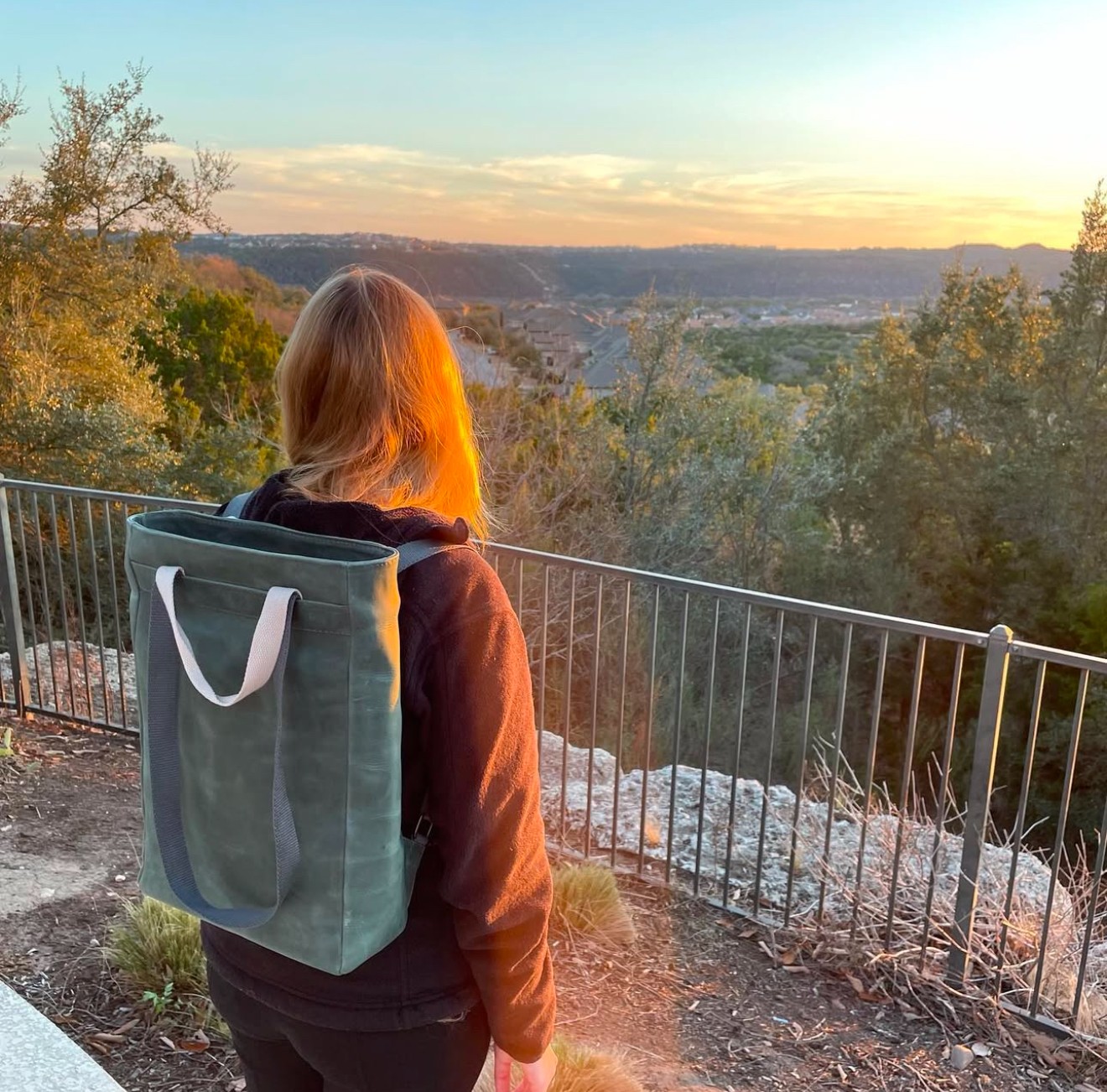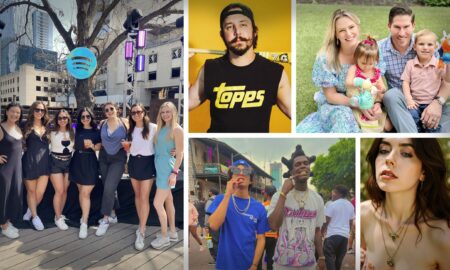

Today we’d like to introduce you to Sara Sloan
Alright, so thank you so much for sharing your story and insight with our readers. To kick things off, can you tell us a bit about how you got started?
I grew up in Austin, Texas. I was a Doss, Murchison, Anderson kid, and graduated in 1998; I attended the Plan I Honors Program at the University of Texas at Austin and joined KKG. I moved straight up to Lubbock for a few years after college graduation and attended Texas Tech University for a JD/MBA, before dropping out to pursue my PhD at Texas Tech. I moved to New York City after that to teach at Columbia University’s University Writing Program and attend the School of the Arts at Columbia University. I stayed in New York City for close to a decade after that, while writing and teaching at Columbia University and Marymount Manhattan College. I had my son and daughter in NY, before finally deciding I was tired of the ice and snow, so I moved us all back down to Austin. I was a stay at home mom for a few years, after my son was diagnosed with FPIES (a rare disease), so by the time I was ready to return to work, I really didn’t care about teaching or climbing the tenure track ladder. I had written my Honors Thesis on Sexuality in Third Wave Feminism, so issues around gender, race, and sexuality had always been of interest. This time I decided to pursue a MAC in Marriage and Family Therapy, so that I could become a sex and couples therapist. While I was finishing my degree, my husband, Marc Geronimo, decided he wanted to buy another business and grow it to help supplement our income at the new therapy practice, Austin Concierge Therapy. Marc has an MBA and has always been an entrepreneur, in addition to being a hypnotherapist, so we decided to crowd source the down payment from family and go for it.
We originally purchased the travel backpack and bag business right before the pandemic. Its original name was Atlas Supply Co, which is the name the old owners had given it. The purchase was unfortunate timing, which turned out to be both a blessing and a curse, because COVID hit about nine months after we bought it. We were able to keep the business going during 2020, but sales had dropped down to less than ten percent of what they’d been almost immediately, so we leveraged our credit as much as we could for as long as we could do it, but it turned out to not be enough The original owners of the business refused to renegotiate the terms of the contract and then they sued us for the full amount assuming we had it to give. They were mistaken, so in order to avoid losing everything, the lawsuit forced us to file for bankruptcy. After the bankruptcy was complete, they left us with the remaining bags and the designs, so we debated for a couple of years on whether to try to revive the business, given how terrible the last few years had been with it. We decided that if we were going to go through with the difficulty of relaunching the business and starting it all over again from scratch, we wanted the business to fit who we are now; this is how we came up with the name and concept of Native Soul.
When I was a child, I grew up going to pow wows with my dad, who’s own father grew up on the Choctaw reservation. My dad’s uncle had attended Kiowa College, and my dad’s favorite aunt, who’d helped raise him, was Comanche. I don’t know much more about my grandfather’s side beyond these few facts, but I remember him being one of my favorite people as a child, before he went to jail and I never saw him again. So I have no tribal affiliation, but I do understand the trauma my dad’s side endured growing up on the reservation, with the Indian schools, the racism, the substance abuse and the violence. After the pandemic, my cousin Eagle joined me and my family in Austin, while he pursued his MAC in counseling. Eagle is a member of the Hopi tribe and a sun dancer, but mixed with the beauty of his culture, his side had endured similar intergenerational trauma. As Marriage and Family Therapists, we talk all the time about the best ways to help people move through their trauma, and were saddened that so many indigenous and BIPOC people can’t afford some of the best trauma treatments, such as psychedelic assisted therapy and ketamine, due to a lack of money. In talking together, we decided on combining the new business, Native Soul, with a non profit, where we could donate a portion of the earnings from the bags to provide psychedelic assisted therapy through scholarships for other indigenous and BIPOC people. The term, “Native Soul,” can be used as a synonym for “Spirit,” or the “Great Spirit,” which is what came to Marc, while meditating.
We’re still very much in the beginning processes of relaunching Native Soul Trading Co and the adjoining non profit, but this added layer of meaning with the non profit has helped make the business feel exciting again. Native Soul has a purpose I can get excited about, because I know how much this will be able to help individuals and families who need to heal, while it also allows me to play with my artistic side again designing new bags again.
We all face challenges, but looking back would you describe it as a relatively smooth road?
No, the road to creating Native Soul has been anything but smooth. We have had to figure out how to start a company on a shoe string budget, using only me, Marc, Eagle and our three teens as resources. Luckily, we’ve been using this as an opportunity to teach our kids about business, accounting, advertising, marketing, and logistics. We only survive if everyone works together like a tribe. No one person is more important than another, because every part is necessary for Native Soul to succeed. We hope to live by the ideals that helped create Native Soul. Luckily, I think the bankruptcy from the original business acted like a crucible, in that it forced our family to really rely on each other in a way that had never happened before. In addition to it bringing us closer as a family, the goal is to begin paying the kids for their work, once the business is profitable, starting each a 401k, and giving them money they can also use to pay for college. We’re currently looking for a new manufacturer and leather provider in Mexico, because our last supplier went down during the pandemic. We’re also learning so much about navigating and harnessing social media to help with our relaunch. So, if there are any influencers interested in our business, please reach out. We would love to collaborate.
Thanks – so what else should our readers know about your work and what you’re currently focused on?
Native Soul has been an amazing way to return back to my roots, in every sense of that meaning. I have always been interested in Indigenous, BIPOC, and women’s studies. I wrote my Honors Thesis at UT- Austin on Sexuality in Third Wave Feminism. Then my dissertation was a hypertext novel published by Virginia Tech, where I used a non-traditional narrative style to explore women’s and indigenous storytelling, which is very different than the standard linear model. My thesis at Columbia University looked at the intersectionality in my own family, exploring how omissions in one’s past often defines much of one’s story. Now in my private practice at Austin Concierge Therapy, I work as an AASECT certified sex therapist and an Imago Relationship Therapist, where I use a combination of Feminist Therapy, Narrative Therapy, Cognitive Behavioral Therapy, and Psychedelic Assisted therapy to help people take control of their story and to begin to shed the trauma that gets in their way of living a complete and fulfilled life. I am probably best known, however, for some of the writing I still do; I contribute to the Kama Sutra section of Cosmopolitan, and often write and contribute to Mind Body Green, Elite Daily, ZocDoc and many other publications on topics like epigenetic trauma, domestic violence, sexual trauma and Narcissistic abuse. These last subjects are ones that mean the most to me, because to heal from them is life changing. I have been a victim in the past and my goal has been to help as many others heal using all the tools I have at my disposal. My husband, Marc Geronimo, is a Marine Corps veteran that is pursuing his PhD in psychedelic assisted therapy, which is one of the best treatments for war veterans, sexual assault survivors, and childhood abuse victims. We’re currently partnering with Texas Direct Medical Care to open a ketamine clinic with Dr. Cliff Porter (Dr. Porter is also a retired Army Colonel). Psychedelic Assisted Therapy helps to reprocess any maladaptive stress patterning, reset inflammatory systems, and provide an antidepressant effect, all of which aid in deep level trauma processing to give our clients their lives back again. I think what sets us apart is our passion for this work. Both Marc and I had very successful careers, long before becoming therapists. We both took turns returning to school, because helping people heal, especially women, Indigenous, and BIPOC, is what we’re passionate about. We also love creating new innovative and beautiful products that help us and the world around us continue to heal.
Are there any apps, books, podcasts, blogs or other resources you think our readers should check out?
I love anything written by Gabor Maté, who is bringing healing methodologies, such as plant medicine and psychedelic assisted therapy, into the mainstream. Much of Maté’s work was with the First Nations of Canada, so there is a lot to learn from his years of experience helping them heal. I also love “Diary of a Part Time Indian,” by Sherman Alexie, and “This is How You Lose Her,” by Junot Diaz. Stephen Graham Jones was my dissertation advisor at Texas Tech, and I love his comic, “Earth Divers: Kill Columbus,” and some of his short stories are heart wrenching. I’ve always enjoyed Susan Minot’s, “Lust,” and Mary Gaitskill’s, “Bad Behavior,” which are beautiful story collections that explore women’s sexuality. In terms of social media or blogs, I always enjoy “Relentless Indigenous Woman,” who combines the intersectionality of being a queer indigenous woman with the politics of today.
Pricing:
- $230 Vegan/Canvas Hero Backpack
- $330 Leather Hero Backpack
- $135 Vegan Artist Tote
- $179 Leather Artist Tote
- $149/$159 The Sage Backpack
Contact Info:
- Website: https://nativesoul.co/
- Instagram: https://www.instagram.com/nativesoultc/
- Facebook: https://www.facebook.com/people/Native-Soul-Trading-Co/61569646203308/








Image Credits
Sara Sloan, Marc Geronimo, Native Soul Trading Co













